The continuing Israeli attacks on Iran have brought into focus the destabilising role that Tehran has been playing globally. Ever since the birth of the Islamic Republic of Iran in 1979, the regime has been responsible for a considerable degree of damage worldwide. The Islamic Revolutionary Guard Corps (IRGC) has conducted terrorist acts in multiple countries, and the UK has recently foiled a terror plot by Iranian operatives.
The IRGC also helped create armed proxies across the Middle East that have acted as tools of influence for Iran as it pursues an expansionist strategy in the region. But in doing so, these groups have wreaked havoc in their countries of operation and beyond.
For example, in tandem with the IRGC, Hezbollah assassinated Lebanon’s former prime minister Rafic Hariri in 2005, intervened in the Syrian conflict to violently prop up the regime of Bashar al-Assad and then became a key actor in Syria’s drug trade during Assad’s rule.
It has conducted terrorist acts in Europe and Latin America, and also remains active in illicit finance, cooperating with Latin American cartels to supply Europe with drugs while using the old continent as a hub for money laundering.
Although the UK finally proscribed Hezbollah as a terror organisation in 2019, it has not applied the same status to the IRGC. One reason behind this divergence is that Britain does not have a mechanism for designating state entities.
But another reason is lack of political will, with successive British governments worrying that proscribing the IRGC would damage an already tumultuous relationship with Iran, which regards the UK with suspicion because of its alignment with the Islamic Republic’s chief nemesis – the US.
When former US president Barack Obama spearheaded a nuclear deal with Iran, the UK was quick to sign it, ignoring the main shortcoming that the agreement focused only on Iran’s nuclear programme. The deal did not address Iran’s other destabilising actions, from its proxies in the Middle East to its ballistic missile programme and its responsibility for terrorist acts worldwide.
Overlooking Iran’s role in the international drug trade and terrorism has only exacerbated the threat posed by it to Israel’s security and global stability
Overlooking Iran’s role in the international drug trade and terrorism has only exacerbated the threat posed by it to Israel’s security and global stability
The 7 October 2023 attack on Israel by one of Iran’s proxies, Hamas, is partly a consequence of the west’s myopic policies towards Iran. Having faced few repercussions for rogue behaviour, Iran and its proxies grew confident that they could act with impunity.
Had diplomacy been utilised earlier to negotiate with Iran a comprehensive deal that included the nuclear programme but also addressed Iran’s other problematic actions, the7 October attack might not have happened and Israel would likely not have had to try to eliminate by sheer military force what it regards as its main source of threat in the Middle East.
The White House has announced a two-week window to try to bring Iran to the negotiating table to get it to accept abandoning its nuclear ambitions and to contemplate involving the US in the Israel-Iran war directly.
Newsletters
Choose the newsletters you want to receive
View more
For information about how The Observer protects your data, read our Privacy Policy
But Israel is unlikely to halt its military campaign against Iran, which, it says, destroyed more than half of Iran’s missile launchers in just one week. Israel is more likely to use the two-week window to continue obliterating Iran’s arsenal. The Iranian regime is also unlikely to accept being seen as surrendering to the US and has said it will not negotiate while Israel’s bombing continues.
The UK is wisely treading carefully regarding military involvement in the Iran-Israel standoff and has extended a diplomatic hand to Iran to try to de-escalate the conflict. But there are strong signs that the Iranian regime will not be able to withstand a joint Israeli-US military campaign.
The UK urgently needs to come up with a policy on Iran that is grounded in this reality. There needs to be planning that does not take for granted that the regime in Iran is going to survive.
Planning for the day after must be coupled with addressing the realities on the ground, such as Iran’s role in the global drug trade and international terrorism. Overlooking them has only exacerbated the threat posed by Iran to Israel’s security and global stability.
The UK bears a responsibility to do all it can to remedy the consequences of its lack of a comprehensive policy towards Iran.
Lina Khatib is an associate fellow at the Middle East and north Africa programme at Chatham House and a visiting scholar with the Harvard Kennedy school’s Middle East initiative
Photograph by Atta Kenare/AFP/Getty


